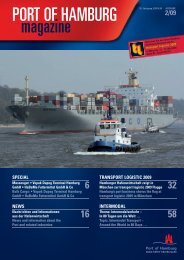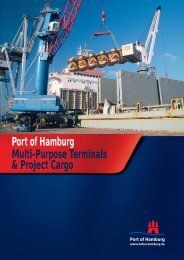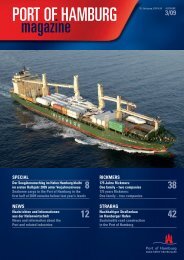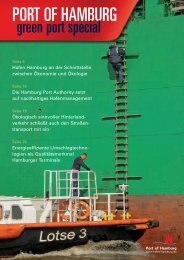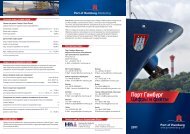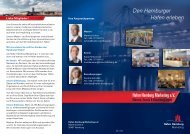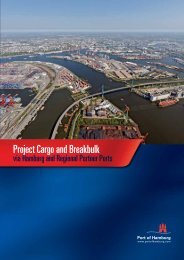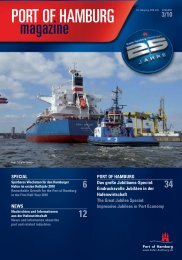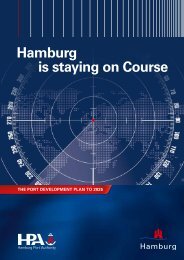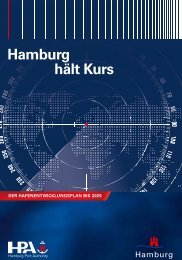PORT OF HAMBURG magazine - Hafen Hamburg
PORT OF HAMBURG magazine - Hafen Hamburg
PORT OF HAMBURG magazine - Hafen Hamburg
- Keine Tags gefunden...
Sie wollen auch ein ePaper? Erhöhen Sie die Reichweite Ihrer Titel.
YUMPU macht aus Druck-PDFs automatisch weboptimierte ePaper, die Google liebt.
Thorsten Nölle, Key-Account-Manager, APL Logistics Germany < InterviewGrafik: APLYour German head office is locatedhere in <strong>Hamburg</strong>. How would yourate the port and logistics locationof <strong>Hamburg</strong> as an interface, or hub,between India and Europe?Thorsten Nölle: As the mostimportant container port for Indianexports and imports in Europe,<strong>Hamburg</strong> already plays a leadingrole today, and it is bound to extendits lead further. For companies withforeign trade links with India, theparticular advantages of the portAPL-Büros und -Anlagen in Indien/APL officesand facilities in India.Foto: APLand logistic centre in the metropolitanregion of <strong>Hamburg</strong> are theshort transport routes between<strong>Hamburg</strong> and the Baltic Region,as well as to Germany’s othereconomic centres, to Austria and tothe various countries in central andeastern Europe. The Baltic Statesand Russia, too, are more readilyaccessible via <strong>Hamburg</strong>, comparedwith the considerably more distantwestern ports. Since shorter transportlinks also mean lower costs,this is certainly a competitiveadvantage for <strong>Hamburg</strong>.What are the principal export andimport commodities, and how to yousee the trade with India via <strong>Hamburg</strong>develop in the future?Thorsten Nölle: Textiles andclothing play a leading role, withIndia’s exports of around 254,803TEU ranking second only to China.The removal of the textile quotahas led to strong growth in textileexports worldwide since January2005. <strong>Hamburg</strong>, as an importanthub in the trade with India, isset to be benefit from this as well.In 2006, about 17,000 TEU(174,200 t) of clothing andtextiles from India were handledin <strong>Hamburg</strong>. Other containerisedexport commodities transhippedthrough <strong>Hamburg</strong> in the year2006 include synthetic resins(approx. 203,000 TEU), metalproducts, as well as iron andsteel (160,000 TEU), foodstuffs(173,000 TEU) and automotiveparts (47,000 TEU). Exportcommodities shipped to Indiavia <strong>Hamburg</strong> in containers oras conventional cargo includefertilisers, machinery and equipment,motor vehicle components,iron / steel, paper and chemicalproducts. Overall, some 1.65million t of sea-borne cargooriginating in or destined forIndia was handled in <strong>Hamburg</strong>in 2006.In <strong>Hamburg</strong>, the City and port-relatedbusinesses are investing millions in aneffort to upgrade the harbour facilitiesand the transport infrastructure andkeep up with the unabated growth incargo volumes. How would you ratethe infrastructure in India?Thorsten Nölle: India is stillsuffering the consequences ofhaving inadequate, unreliable andoverloaded transport links, wherethe different transport modalitiesbarely interconnect. Transportationof goods from and to the majorbusiness centres and seaports stillpresent a major challenge for allparties involved. Transport linksbetween seaports and the hinterlandare inadequate, and passengertraffic usually takes precedenceover cargo. These problems arewell understood, and privatecompanies are increasingly investingin telecommunications as wellas in ports and roads. The projectedannual growth in road traffic of 8to 10 per cent is barely manageable,even with a road network spanning3.32 million km. India has theworld’s densest rail network,covering 62,800 km. Internationaloperators are meanwhile giventhe option of operating their owncontainer trains. APL Logisticsprovides a good example in thiscontext. We were the first internationaltransport and logisticsgroup to be given permission tooperate a container train on theDelhi–Mumbai route. The APLIndiaLinx connects the InlandContainer Depot (ICD) Loni withthe Jawaharlal Nehru Port inMumbai three times a week.Additional container train linksare currently being planned andwill follow soon. In addition, APLLogistics was also awarded thehighly coveted “All India” license,which allows us to set up a comprehensivetransport and logisticsnetwork. The most serious trafficbottlenecks are still in the ports.All 12 ports operated by the PortTrust of India have either reachedthe limits of their capacity or arejust about to reach them. Any growthin sea-borne foreign trade can only beachieved by speeding up the clearingof ships in Indian ports. >>><strong>PORT</strong> <strong>OF</strong> <strong>HAMBURG</strong> MAGAZINE 1/0847



